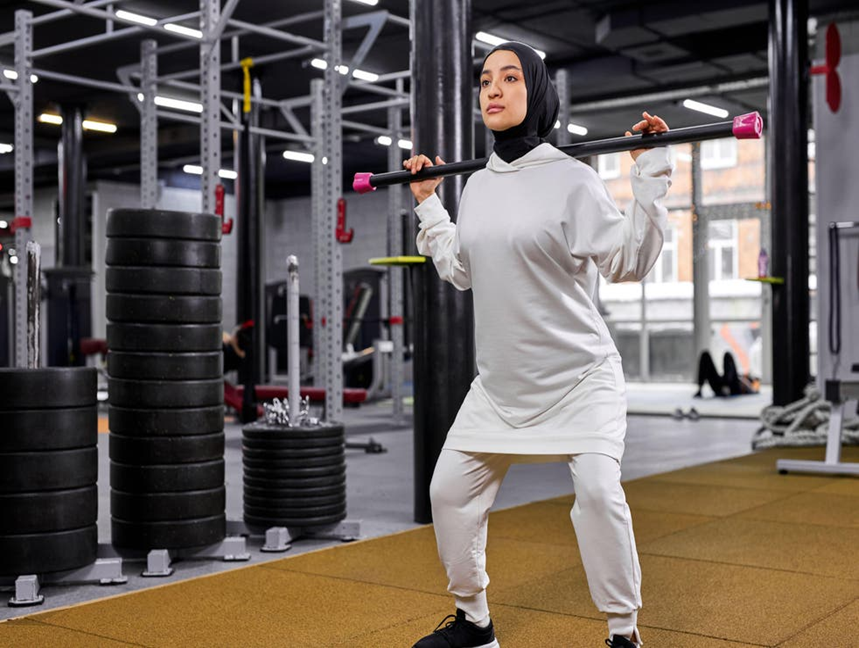Dissident to the famous view, Ramadan is almost more than just refraining from eating and drinking. It’s a period where you’re motivated to deprive them of distractions and amenities, to live more simply with more prayer, more gratitude, more reflection. Ramadan is a great point for Muslims because it implies getting closer to God, getting nearer to family, and endeavoring to become a more reasonable person. Fasting throughout the sacred month doesn’t require wiping out your fitness, healthiness, and muscle boosts. Working out, eating healthy, and practicing spirituality combined will have a synergic impact on you. Therefore, your outcomes will be fast, and in one month you can change your life.
Workout during Ramadan – pounding the gym during Ramadan – is tough though not impossible. People have other wellness levels, and those can alter at various spans. Therefore, you ought to find out what timing and level of intensity position for you. Energy levels descend because of all of this, and workouts can become massive labor. There’s no excuse why you keep giving this up during Ramadan. Fasting is one of the most useful techniques for weight loss.

Here are some best time periods in which you can go for your workout according to your own choices, then we will discuss practical tips for effective workouts also.
- Before Suhoor:
If you are disciplined and bring up mode before suhoor, operating out slightly before suhoor time can be useful for your time and bedtime timetable. However, for most, it is impractical and requires lots of determination and the right amount of sleep.
- Before sunset
A light work-out towards the cooler parts of the day will tell you can shortly fill yourself with water, and reap the advantages of exerting on a vacant stomach. Nevertheless, any workout done at this time should be low-key with better resistance exercise, low recurrences and consequences, and lots of elongation. This is also the right moment for a short fast walk or light jog.
- While Fasting:
It is only attainable to work out right before you spoil your fast. It is a famous option as most individuals are busy after iftar. Right before iftar, most gain a point to beat, and some believe engaging in physical exercise can be a wonderful manner to remain healthy and work time.
- After Iftar:
Excellent time to work out but you live a little short of time. It can perform for you if you carry a pre-workout feast during iftar and run for a 30 minute HIIT.
- After Taraweeh prayers:
After prayers, you have a bunch of time to work out. Get a pre-workout shake and hit the gym. That is likely if you stay up the entire night till Suhoor.
For most satisfactory results, support alternate workout days, if you already workout for 1 hour on ordinary days, then half an hour of a workout session is most reasonable. It also relies on your fitness and the intensity level. If low to medium intensity, then work out for 45 minutes.
Based on good bioscience and unique experience, here are my 12 suggestions for a workout in Ramadan. So there you own it guys.
1.. Keep yourself hydrated.

Water has no calories unlike other beverages and supports refilling your thirst. Make sure you consume at least eight to nine drinks of water. There are some foods better hydrating than others like Watermelon, Yogurt, and Cucumbers. Fasting during the summer will exhaust you. You require moisture for your body and brain to function effectively. Try to consume water throughout the night and during your workout session. Just don’t exaggerate it as surplus water will interrupt your sleep and force you to urinate every pair of hours…
Make sure you consume surplus when you can, getting in as much water as you need to maintain yourself hydrated during the fasting hours. Pay attention to electrolytes: eat salted food for the sodium, consume electrolyte-heavy fruits like bananas, and endeavor to obtain some sugar into your diet for glucose.
2. Find your light hour

Souad Gharib, a proprietor of women-only private activity service Female Trainer, says getting her workouts accomplished earlier in the daytime allows her to feel energized during the difficult afternoon hours when appetite and tiredness can normally put in.
3. Every Day Workout Without an Excuse

Firstly, you should have to decide to exercise or workout daily. Do you know fasting for 30 consecutive days without performing any physical exercise, workout, or activity reduces strength and fitness? So you should decide to do exercise daily. Working out or exercising in a fast state may promote good brain health and keep muscles biologically young. Use your fast as a possibility to handle what you are eating and drinking – to assemble favorable changes to your diet and lifestyle.
4. Try strength training

Trying to serve at your normal power will potentially burn you out, be unachievable, and will probably be painful. Work on perfecting the shape with more delicate inspiration, no matter your firm domain, so you can come back strongly when Ramadan is over. If you are examining to misplace weight, then cardio can be a perfect option. Doing fasted cardio will be more useful if you are trying to cut fat. Strength Training or weight lifting should solely be done while not fasting. You will lose lean muscles tissue if you work out during fasting.
5. Exercise, even if it’s just for 20 to 30 minutes per day
If you don’t hold the power for a 45-minute workout, the only factor in whatever gentle activity you can is. Moving to the gym during Ramadan can be hard enough, let alone pushing yourself hard when you get there. Try running for moderation, instead of shooting beast manner. Diet and training ought to be restrained throughout the whole month and intensity levels will vary from person to person. Low-intensity workouts are a good idea for workout during Ramadan, as are more straightforward sessions evenly spread throughout the day. Rather than hitting a hard session for an hour and a half, try a few 20-30-minute lighter sessions.
6. Try to coach immediately before or after breaking the fast
During the fast, with high temperatures and no liquids from sunrise to sunset, you will compromise your health by pushing yourself too much. Before is OK, after exists more useful. I’ve instructed at both times, and in my experience, exercise after spoiling my fast consistently resulted in a more suitable workout session with more strength and more energy.
7. Avoid super-intense cardio
This one reaches out to all the cardio addicts. If you are fasting, your body is not functioning at its optimal degree. You are numerous probably dehydrated, sleep-deprived, and down on blood sugar. Therefore, it presumably doesn’t create much reason to do hard break workouts or wild action cord circuits. Remember, you will be thirsty, so your body will utilize your fat repository as a source of energy, particularly if you do your cardio before iftar.
8. Lighten the weight, expand the number of reps
This matter arises from personal preference more than anything, and other lifters may disagree with it. Yet, in my understanding, fasting for a long duration will suck the juice out of you. I merely cannot raise as seriously as I usually can while fasting. Thus, I’d suggest maintaining the reps in the medium to an increased rep range, around 6-10. Don’t raise your ego. Adjust to the situation. Do those practices and workouts comfortably within your wellness status?
Experts recommend that you should reduce the intensity by at most smallish 20%. Lower your reps and sets, lower the weight, improve your rest time, and reduce your speed on cardio. Your workout purposes should be to retain muscle mass, given you live with a calorie obligation for the month, decreasing your energy is the best method.
9. Ingest an Adequate Quantity of Carbohydrates
Carbohydrates are very important in supplying fuel for your workouts – particularly if you prepare tough. You should aim to ingest an adequate quantity of carbohydrates so that your body has adequate glycogen resources. Some good specimens of carbs to eat are rice, pasta, potatoes, quinoa, fruits, vegetables, and shrimp… Try to ingest a healthy average meal with proteins, complicated carbs, and wholesome fat. This balanced system and composition will hold you energized and served for many hours. Some excellent choices are peanut butter toast with banana stakes, eggs on toast, and smoothies.
10. Keep your pre-workout meal light
There’s nothing more threatening than moving to the gym on a full stomach. Instead, eat a light, small meal consisting of protein, carbs, and healthy fats. An illustration of this could be a protein shake blended with milk, a handful of nuts, a banana, and some dates.
Though I still support consuming ‘real’ food instead than shakes where possible, shakes come inconveniently if you need to hit the gym soon after eating. This is because they’re typically readily digested and light in your stomach. After you’ve labored out, you can eat a more considerable meal. Again, this should consist of protein, fats, veggies, and carbohydrates.
11. Count the quality and quantity of your meal
This goes for both your foremost meal and at suhoor. Resist the enticement of consuming sweets or junk at this time. I know it can be difficult. When relatives get jointly and everybody’s pleased, it’s difficult to say no.
12. Foodstuffs to Avoid
Ramadan Plan your meals to avoid lowering up with low-value food to stay on route with your targets. Cut out fried and sugary food on your menu. Not only sugary in pastry, cakes, conventional sweets, etc. and can but also try to evade heavy, fatty foods such as oily curries and anything fried which drips with oil, particularly at Iftar time. As they will leave you feeling lethargic and incapable to reach the peak version. Caffeine is a diuretic that will cause you to want to urinate a lot better than expected. Also try to avoid foods that are increased in salts and Refined carbs such as white bread and white flour. Avoid spicy food which may irritate the stomach with indigestion and bloating.


